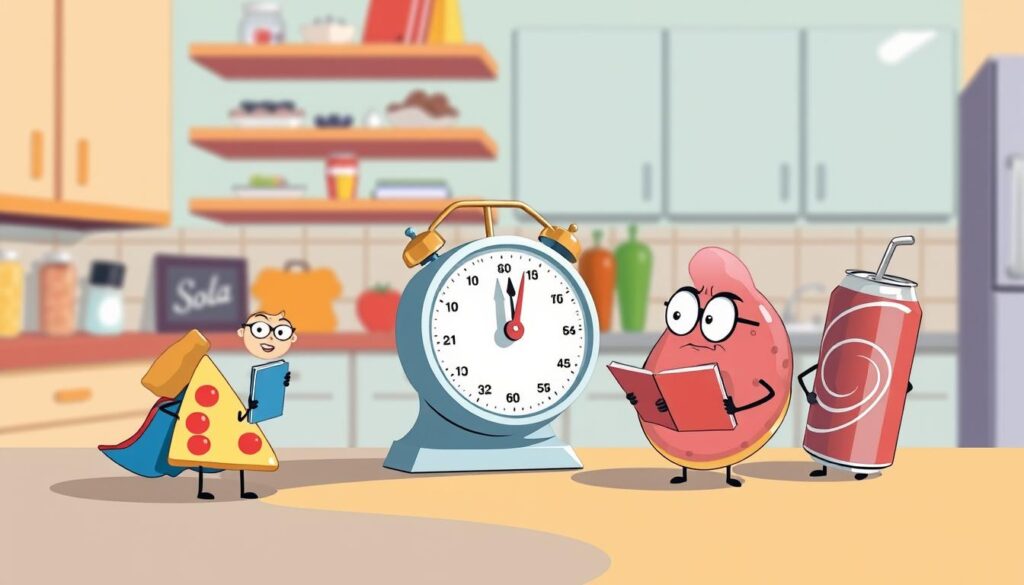The “eat less, move more” idea is often seen as key to losing weight. But, losing weight is really complex. It involves many things like your genes, where you live, how much you exercise, any health issues, your mental health, and what you learn about food.
This guide will dive into the science of losing weight. It will also clear up some big myths. And it will give you real tips to start a healthy lifestyle change.
Key Takeaways
- Weight loss is more than just eating less and moving more.
- It’s important to understand hormones, macronutrients, and food quality for weight management.
- Creating a lasting calorie deficit and eating mindfully can help you succeed.
- Using high-intensity workouts can help you lose fat faster.
- Getting enough sleep, managing stress, and having a support system are key to keeping weight off.
Understanding the Science Behind Weight Management
Keeping a healthy weight is complex. It involves calorie intake, energy use, and hormones. Knowing this science helps you make healthy choices.
The Role of Caloric Balance
Caloric balance is key to weight management. Eating more calories than needed leads to fat storage. Eating less than needed helps you lose weight. A calorie deficit is important for weight loss.
How Your Body Processes Energy
Your metabolism affects how you use energy. Age, gender, muscle, and activity level change your calorie burn. Knowing how your body uses nutrients helps you eat better.
The Impact of Hormones on Weight
Hormones like insulin and cortisol affect weight. Insulin controls blood sugar and fat storage. Thyroid hormones and stress hormones also play a role. Understanding hormones helps you manage your weight better.
| Macronutrient | Impact on Weight Management |
|---|---|
| Proteins | Promote satiety and preserve muscle mass during weight loss |
| Fats | Provide long-lasting energy and support hormone production |
| Carbohydrates | Rapidly affect blood sugar and insulin levels, influencing energy storage and utilization |
Understanding weight management science helps you make better choices. This supports your health and wellness goals.
The Truth About “Eat Less Move More”
The “eat less, move more” idea for losing weight seems simple. Calorie-restricted diets can help you lose weight at first. But keeping up a calorie deficit for a long time is hard.
Studies say low-carb diets might work better for keeping weight off than low-fat diets. The “eat less, move more” idea doesn’t talk about how our mind and surroundings affect our food choices. It can make us eat less mindfully and might lead to binge eating.
Not all calories are the same. Foods high in refined carbs can make us gain weight. But foods rich in protein and healthy fats can make us feel full.
“Any form of exercise is beneficial for overall health, including improved blood sugar control and mental health.”
While calorie restriction and exercise are good, the best way to lose weight is to be more holistic. This means making lifestyle changes and dealing with emotional and psychological issues. It’s about being well overall, not just focusing on weight.
Understanding the complexity of weight management is key. By taking a balanced and evidence-based approach, you can reach a healthier life in a lasting way.
Why Not All Calories Are Created Equal
When we talk about weight, saying “a calorie is a calorie” is too simple. Not all calories are the same. The food you eat matters a lot.
Complex vs. Simple Carbohydrates
Carbs can be simple or complex. Simple carbohydrates are in sweets and sodas. They cause blood sugar to rise and can make you gain fat.
Complex carbohydrates are in fruits, veggies, and whole grains. They give energy slowly and make you feel full.
Protein and Fat for Satiety
Protein and fat take longer to digest than carbs. This makes you feel full longer. High-protein diets can even help you lose weight without counting calories.
Foods like boiled potatoes, beef, eggs, and beans are very filling. They help you eat less and can aid in weight loss.
The Impact of Food Quality on Health
The nutrient density and macronutrient composition of your food matter a lot. Refined foods often lack important nutrients. Eating whole, nutrient-dense foods is better for your health.
“The quality of the food you eat is just as important as the quantity.”
Knowing about different macronutrients helps you make better food choices. This supports your weight goals and health.
Creating a Sustainable Calorie Deficit
Weight loss is more than just counting calories. It’s about finding a balance that fits your life. Focus on eating right and moving more to lose weight for good.
For lasting weight loss, aim for a 500-calorie daily deficit. This slow pace helps you keep the weight off longer than quick fixes.
Know your calorie needs based on age, gender, height, weight, and how active you are. Use online tools or talk to a dietitian to find your calorie goal.
Eat foods that are good for you, like whole grains, lean meats, and healthy fats. This keeps you full and gives you energy. Also, watch your portion sizes to stay on track without feeling hungry.
Adding exercise to your day helps you lose more weight. Try walking fast, biking, or lifting weights to burn calories and speed up your metabolism.
Weight loss is a long-term journey, not a quick fix. Slow, steady changes in your diet and lifestyle lead to lasting health benefits.
“The key to sustainable weight loss is finding the right balance between calorie intake and physical activity.”
The Power of Mindful Eating Practices
Having a good relationship with food is key for keeping a healthy weight. Mindful eating is a great way to do this. It helps you listen to your body’s hunger and fullness signs. You also learn to enjoy your food more by using all your senses.
Recognizing Hunger and Fullness Cues
It’s important to know when you’re hungry or full. Listen to your body’s signs, like a growling stomach or feeling too full. Don’t just eat because it’s time or because there’s food in front of you. Eat when you’re really hungry and stop when you’re full.
Breaking Emotional Eating Patterns
Mindful eating helps you understand why you eat. It’s not just about being hungry. It’s also about feeling stressed or bored. By being aware of these feelings, you can stop eating for the wrong reasons. This can make your relationship with food better.
Practicing Portion Control
Mindful eating makes you eat slower and enjoy your food more. This helps you know when you’ve had enough. You won’t eat too much and you’ll feel better. Enjoying your food more makes eating more rewarding.
| Mindful Eating Practices | Benefits |
|---|---|
| Recognizing hunger and fullness cues | Helps you eat when truly hungry and stop when comfortably full |
| Breaking emotional eating patterns | Promotes a more positive and balanced relationship with food |
| Practicing portion control | Supports sustainable weight management by preventing overeating |
Mindful eating is a great way to manage your weight and feel better. It helps you listen to your body, stop emotional eating, and eat the right amount. This makes your relationship with food healthier.
“The beauty of mindful eating is that it’s not about restriction or deprivation. It’s about savoring the experience of food and being fully present in the moment.”
Effective Exercise Strategies for Weight Loss
Physical activity is key for weight management. “Eating less and moving more” sounds simple, but it’s not that easy. High-intensity exercise is great for losing fat because it boosts your metabolism and burns more calories than low-intensity exercise.
Any kind of regular physical activity is good for you. This includes brisk walking, swimming, or strength training. Studies show that keeping weight off long-term means being active. This means doing aerobic exercise for 30 minutes most days and strength training at least twice a week.
For weight loss, start slowly. Begin with walking a mile or lifting light weights. Then, increase how hard and long you exercise. This way, you avoid injuries and stay active for longer.
The “eat less, move more” plan might not work for everyone, especially middle-aged adults. They might need a more detailed plan that includes sleep, stress, and hormones.
| Exercise Strategies | Benefits |
|---|---|
| High-Intensity Exercise | Boosts metabolism and burns more calories than moderate-intensity exercise |
| Aerobic Exercise (30 minutes most days) | Helps maintain long-term weight loss |
| Strength Training (2+ times per week) | Builds muscle and increases overall physical fitness |
| Gradual Progression | Reduces injury risk and increases long-term exercise adherence |
Remember, losing weight takes time and effort. Aim to lose 1 to 2 pounds (0.5 to 1 kilogram) each week. Start by losing 5% of your current weight. A balanced exercise routine and mindful eating can help you manage your weight for good.

“Gradual progression in exercise, such as starting with walking a mile and lifting light weights, reduces the risk of injury and increases the likelihood of long-term exercise adherence.”
Building Healthy Habits That Last
Creating lasting healthy habits is a journey. It starts with setting goals, tracking your progress, and overcoming obstacles. By adding new habits slowly, using tools to track your progress, and facing challenges head-on, you can achieve long-term health success.
Setting Realistic Goals
Start by setting realistic goals. Break big goals into smaller steps. For example, instead of exercising for an hour daily, aim for a 30-minute walk three times a week. Celebrate your wins and slowly make your goals harder as you get more comfortable.
Tracking Progress Effectively
It’s important to track your progress. Use tools like fitness trackers or the NIH Body Weight Planner to monitor your goals and well-being. Seeing your progress can motivate you to keep going towards a healthier lifestyle.
Overcoming Common Obstacles
Building healthy habits can be tough. Be ready for challenges like lack of time, cost, or dislike of exercise. To overcome these, make health a priority, find affordable options, and get support. Find fun activities and make healthier versions of your favorite foods.
Changing habits takes time and effort. By setting realistic goals, tracking your progress, and finding ways to overcome obstacles, you can build lasting healthy habits. This will improve your overall well-being.
| Habit Formation Stages | Key Characteristics |
|---|---|
| Contemplation | Individuals are thinking about change and becoming motivated to get started. |
| Preparation | Individuals are making plans and setting specific goals for change. |
| Action | Individuals are actively making changes to their habits within the last six months. |
| Maintenance | Individuals have successfully incorporated changes into their routine for more than six months. |
“Decades of research show that change is possible in adopting healthy behaviors. Individuals can reduce the risk for common health problems like heart disease, stroke, cancer, type 2 diabetes, and obesity by making healthier choices.”
Common Myths About Weight Loss Debunked
Many myths about weight loss can slow you down. It’s not just about eating less and moving more. Real science shows we need a deeper understanding to lose weight right.
Some think fast weight loss is best. But, 85% of people gain back the weight within a year. Slow and steady wins the race.
Another myth is spot reduction of fat. But, you can’t pick where fat goes. Losing weight comes from eating fewer calories, not special pills or exercises.
Also, not all calories are the same. What you eat matters a lot. Foods like complex carbohydrates and high-protein foods help you feel full. But, simple sugars can make you hungry and eat too much.
Lastly, “just eat less and move more” doesn’t always work. Obesity is complex, influenced by genes, biology, and environment, not just willpower.
By knowing and debunking these weight loss myths, you can use better evidence-based approaches. Remember, lasting change needs time, patience, and understanding your body’s needs.

The Role of Sleep and Stress in Weight Management
Good sleep and managing stress are key for a healthy weight. Studies show how sleep, stress, and hormones work together. They affect how well you can manage your weight.
Not getting enough sleep and feeling stressed can mess with your hunger and metabolism hormones. Poor sleep quality makes you hungrier and less full. This can lead to eating too much and gaining weight.
On the other hand, stress management helps keep your hormones in check. Stress can make your body store fat, especially around your belly. It can also mess with how your body uses sugar, leading to weight gain.
To help with your weight, focus on sleep quality and find ways to relax. Try to sleep 7-9 hours each night. Make your bedroom a sleep haven. Do things like meditate, practice yoga, or exercise to reduce stress.
| Key Factors | Impact on Weight Management |
|---|---|
| Sleep Quality |
|
| Stress Management |
|
By working on sleep quality, stress management, and hormonal balance, you can improve your weight management. This leads to better, lasting results.
Maintaining Long-Term Success Through Lifestyle Changes
To keep weight off for good, mix healthy habits into your daily life. Make a plan that covers eating right and staying active. This way, your progress will last through life’s ups and downs.
Creating a Balanced Approach
Finding the right balance is key to keeping weight off. Start by doing more physical activities. Choose exercises you like, like running, lifting, or yoga.
Eat foods that are good for you but not too many calories. Watch your diet and make small changes as needed. This will help you find the best balance for your health.
Adapting to Different Life Situations
Life can change fast, and so should your weight management plan. Deal with stress, work changes, or unexpected events by being flexible. Find ways to handle emotional eating and keep exercising, even when things get tough.
Building a Support System
Having a strong support system is crucial. Get help from friends, family, or a doctor. They can encourage you and give advice.
Joining a weight loss group can also help. You’ll meet people who understand what you’re going through. Don’t face this alone. Use your support network to stay motivated.


A Life-Changing Experience with This Weight Loss Supplement (Nagano Tonic)
I’ve always struggled with finding a weight loss solution that actually works for me. Like many, I’ve tried numerous diets, exercise routines, and supplements over the years—some worked for a short time, but nothing ever gave me long-term results. That was until I decided to try the weight loss supplement I found : Link to the Supplement.
From the moment I started using it, I noticed a difference. Not only did I feel more energized, but my cravings also became more manageable. The best part? I started seeing results much quicker than I anticipated! Over the course of just a few weeks, I noticed a significant reduction in belly fat and overall weight loss that I hadn’t been able to achieve before.
What makes this supplement stand out from all the others I’ve tried is how it supports me in my daily routine without any jitters or energy crashes. I’m able to stay focused and motivated, which has made it easier to stay on track with my diet and exercise plan.
This product truly exceeded my expectations, and I feel more confident and healthier than ever before. If you’re struggling with your weight loss journey like I was, I highly recommend giving this supplement a try. It’s been a game-changer for me, and I’m sure it can work wonders for you too!
Contant Them on email .. tonicnagano50@gmail.com
I’ve tried so many weight loss products over the years, but nothing worked like this supplement! Since I started using it, I’ve noticed a big difference in my energy levels and appetite control. In just a few weeks, I’ve lost weight and feel so much better. It’s been easy to stick with, and the results speak for themselves. Highly recommend this to anyone looking to make a real change!
This Nagano Tonic has been amazing! In just a few weeks, I’ve lost weight, feel more energized, and my cravings are under control. Highly recommend it!
Thats the link to purchase http://surl.li/iasppy